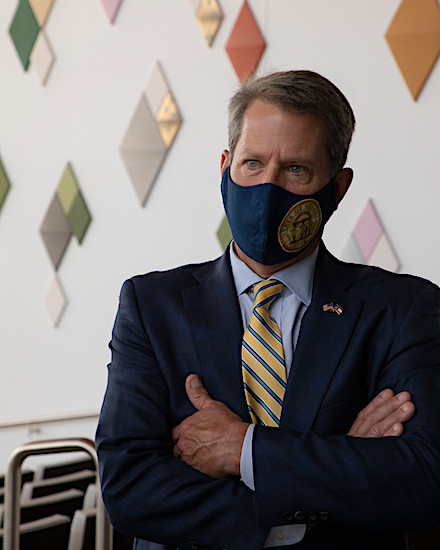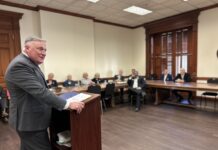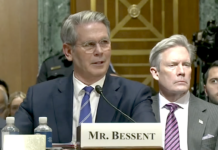
Gov. Brian Kemp sued Atlanta Thursday in an attempt to stop the city from enforcing COVID-19 rules more restrictive than the state’s, including a local mandate that people wear face masks in public and guidelines that urge restaurants that recently reopened dining rooms to stop seating customers.
Atlanta Mayor Keisha Lance Bottoms last week announced the city reverted to public health guidelines with more restrictions than allowed by the state, which the governor’s office maintains is banned under his emergency orders.
The latest back-and-forth between the governor and Atlanta and other city officials comes as mask wearing is increasingly divisive from a dozen city halls to school board meetings across Georgia.
“This lawsuit is on behalf of the Atlanta business owners and their hardworking employees who are struggling to survive during these difficult times,” Kemp said in a statement Thursday. “These men and women are doing their very best to put food on the table for their families while local elected officials shutter businesses and undermine economic growth.”
Since issuing his first emergency order in mid-March as the coronavirus started to spread in Georgia, Kemp has often said he is relying on data to balance the protection of people’s lives and their livelihoods. The lawsuit singles out restaurants as businesses needing protection from the city’s restrictions.
“Relying on Mayor Bottoms’ assertions, some restaurants have closed their doors, believing that closing of their businesses is required to avoid enforcement action by the city,” the suit says.
Bottoms said the city relied on COVID-19 public health data in the decision July 10 to go back to Phase One of the Centers for Disease Control and Prevention’s reopening plan. Those guidelines include a stay-at-home order except for essential trips, no large social gatherings and for restaurants to close dining rooms and only offer curbside or delivery. In late May, Kemp lifted restrictions on many new types of businesses including bars and amusement parks.
After the governor’s office announced the lawsuit, Bottoms responded on Twitter: “3104 Georgians have died and I and my family are amongst the 106k who have tested positive for COVID-19. Meanwhile, I have been sued by @GovKemp for a mask mandate. A better use of tax payer money would be to expand testing and contact tracing. #ATLStrong”
The recent dispute between the mayor of Georgia’s biggest city and the governor is an unraveling of a relationship that as recently as March was strong enough that Kemp named Bottoms to chair one of his Coronavirus Task Force committees.
Prior to the filing of the lawsuit, mayors of some of Georgia’s other cities said they were pressing forward with local face mask mandates even after the governor issued a new order prohibiting them.
Kemp’s preference is to strongly encourage people in Georgia to wear masks out in public when they cannot socially distance. But as cases spiked around the July 4th holiday weekend, local officials across the state pressed ahead with more restrictive local rules.
The Georgia governor’s stance against a statewide mask requirement contrasts with Republican governors in Texas and Alabama who recently announced statewide mask mandates in response to rising cases of COVID-19.
Savannah became the first major Georgia city to order people to mask up as COVID-19 numbers surged, and officials there braced for a busy holiday weekend. Soon after, Atlanta, Augusta, Athens-Clarke County, Decatur and a handful of other cities passed similar ordinances.
Mayors reacting to Kemp’s insistence they follow the limitations outlined in his order ranged from disappointment to outrage.
Savannah Mayor Van Johnson tweeted Wednesday night that the governor does not “give a damn about us” and that his city will continue to follow scientific data to determine the best way to combat the virus.
Athens-Clarke Mayor Kelly Girtz said he believes his government’s mask requirement will withstand legal scrutiny.
“We strongly believe this is within our authority,” he said. “On the practical matter of mask requirements, it is impossible to simultaneously want a successful economy without allowing the tools – such as masks – that will create the vehicle for this success.”
The mayor of Doraville conceded that Kemp’s executive order calls into question his city’s order.
“Public health and safety should never be a political issue,” said Mayor Joseph Geierman. “We are disappointed with Governor Kemp’s recent decision to overrule over a dozen Georgia cities from mandating the wearing of masks, including Doraville.”
Kemp’s earliest emergency orders appeared to give cities and counties some wiggle room so that masks orders would not be inconsistent with the governor’s proclamations, said Georgia State University Law professor Anthony Michael Kreis.
State law provides a governor with a lot of flexibility to handle emergencies when they arise. The question is does the governor’s authority in a public health crisis completely overrule any discretion local governments have, Kreis said.
He said he believes Kemp and state Attorney General Chris Carr have a stronger case against the city for the decision to roll back regulations to include closing restaurant dining rooms.
“But what is hard is, because ironically the governor admits in the complaint that wearing masks is a positive thing for public health, he’s encouraging them to do so,” Kreis said
Cliff Albright, a co-founder of the Black Voters Matter Fund, said Kemp’s attempt to force local governments to drop mask mandates puts Black people at further danger because they are at greater risk of contracting COVID-19.
“Not only is he not helping, he’s rolling back things that local governments are trying to do, and you have to ask what is the rationale,” Albright said.







